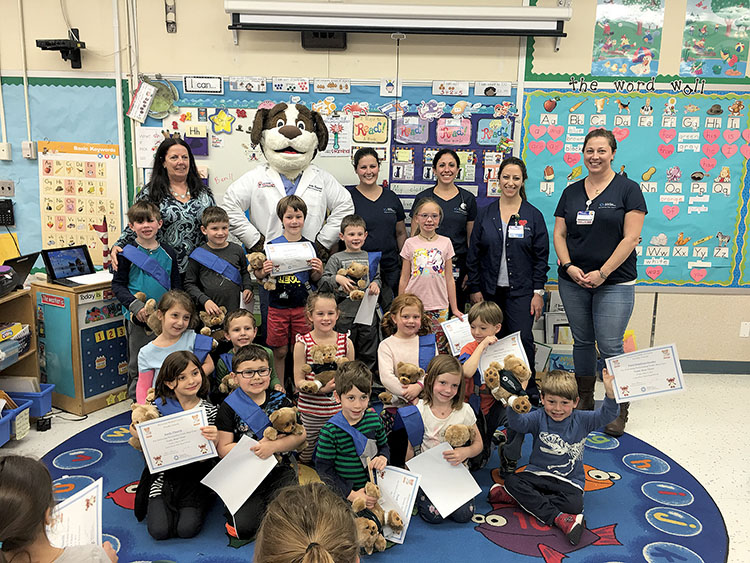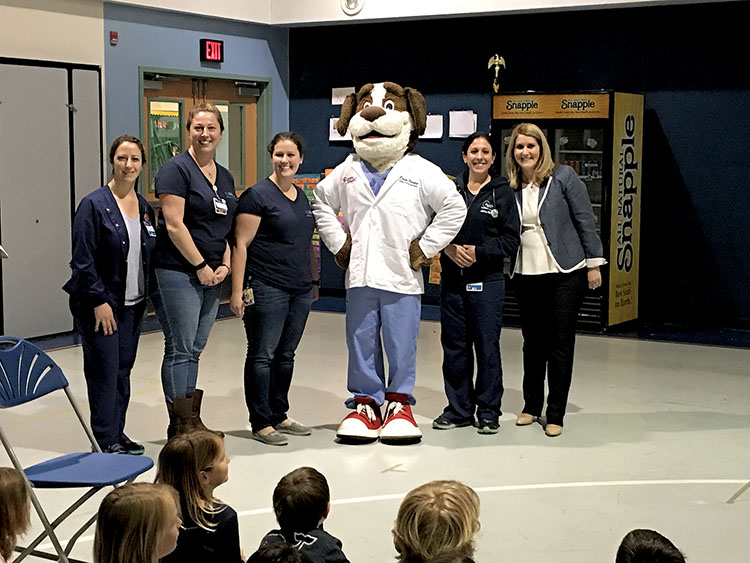LITTLE SILVER – During a recent workshop at Point Road School, a group of kindergarteners stepped into the role of an ER doctor. Led by nurse practitioners from Riverview Medical Center, the children took charge of their teddy bear “patients,” checking vital signs, wrapping up injuries and looking at x-rays.
These Teddy Bear Clinics are intended to help children understand what’s involved witha visit to the hospital or the emergency room – and to talk about how they relate deal with those visits with loved ones. The program, which has been running for three years with the support of the Riverview’s Women’s Auxiliary Care to Give, has grown in popularity each year, spreading to eight local districts, which have eagerly invited them back to talk to kindergarteners and first graders.
“Hospitals can be seen as places that are scary and not so exciting,” said Kelli O’Brien, chief operating officer at Riverview Medical Center and Care to Give president. “But we really want them to know that we’re here to help and hear them.”

Through Teddy Bear Clinics, nurses are able to walk children through a hypothetical hospital visit, with the help of hospital mascot Dr. Bernard and teddy bears provided by Care to Give. The clinics have been a hit with both children and teachers.
“It is a wonderful hands-on experience that helped our kindergarten students feel more at ease if they ever were to go to the hospital,” said Susan Whitman, a teacher at Point Road School. “The team was fantastic and the children couldn’t stop talking about it.”
Once the clinic is over, students are able to take their teddy bears home and continue to care for them – another popular part of the program, according to O’Brien.
“That’s the hard part,” O’Brien said. “You want them to know that it’s not something that we take lightly. It’s a very serious place to be but we don’t want them to be scared. The emergency care nurses do such a nice job of helping to describe that balance to them.”
Part of achieving that balance means talking through different experiences that children have had with the hospital, which gives nurses a chance to connect with them in a safe and friendly classroom environment.
“That’s my favorite thing,” said O’Brien, of hearing those different stories. “Their willingness to share and not be scared is the part that’s so exciting.”
Whether those experiences involve joyful life events like the birth of a baby sister or broth- er, or sad ones like the illness of a family member, O’Brien says these are issues that kids have to deal with. Teddy Bear Clinics help them have that discussion, away from the more clinical setting of a hospital.
“They bring a different type of experience to the kids,” she said. “One that’s not so clinical. It’s the softer side of medicine.”

For Riverview’s Care to Give Council, a women’s auxiliary group established by Riverview Medical Center 89 years ago, Teddy Bear Clinics are a more recent outreach program geared toward making a difference in the community. The council also promotes further outreach events at the hospital and local schools including “Lunch and Learns,” helmet safety demonstrations, nutrition education for children and adults, and “Tweens and Self Esteem.”
“As our community has changed and evolved, the auxiliary has changed along with it, finding their way to make a difference,” O’Brien said. “I think it would be great for anyone who wants [a Teddy Bear Clinic] in their school to reach out to them.”














